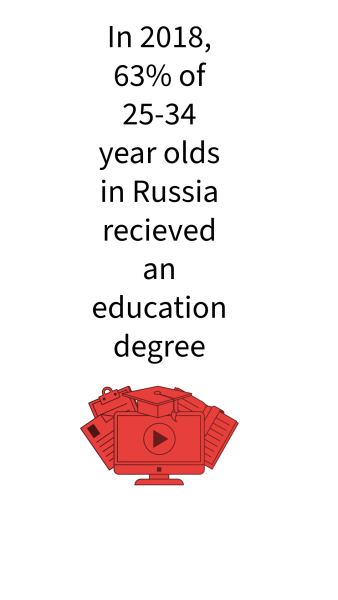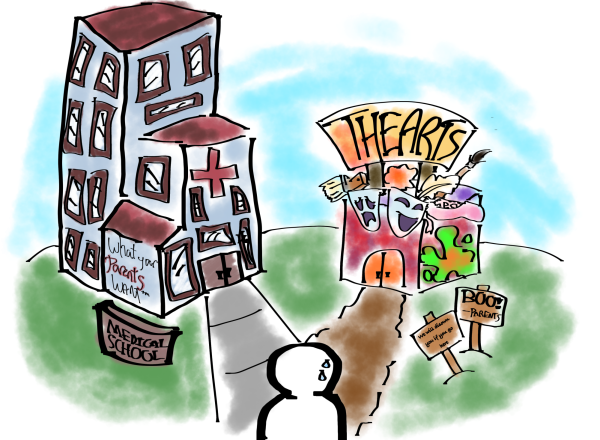

It can be argued that education is one of the most crucial places that shapes and develops children into full-fledged adults. After all, today, school is legally required for children all across the globe. But some could also argue that some pressures that students feel might only do more harm than good. As college admissions rolls around, what should students value more? Prestige, or their own calling?
Finland is considered to be the country with the best education. Students in Finland (quite notably) only spend about five hours in school a day, and are typically assigned little to no homework. Not only that, but the teachers themselves are chosen through a rigorous process.
According to the Smithsonian, “…professionals [are] selected from the top 10 percent of the nation’s graduates to earn a required master’s degree in education.”
Alongside Finland, Russia is also known to have a fairly successful education system, with more than half of 25-34 year olds earning college degrees.
According to the Organization for Economic Cooperation and Development, “in 2018, more than six out of ten 25-34 year olds (63%) in the Russian Federation had attained tertiary education, the second highest proportion after Korea and much higher than the average among OECD (44%)… countries.”
Religious practices and other traditional ideologies can impact family values on education. For example, Confucianism highly values education. Many cultures still strongly believe and follow in these teachings.
From National Geographic, “Confucius believed in the importance of education in order to create this virtuous character.” This virtuous character that Confucius believed in could be achieved through having a sense of humanity (and other morally correct behaviors, such as being honest), which could be taught in schooling.
Similarly, Hinduism also follows that same philosophy. Hinduism aims to offer advice to help someone achieve “enlightenment.” Just like how Confucius believed, Hindus believe that education can help someone achieve said enlightenment.
According to Reema Alpana of Rimzie WordPress, “they believe that through education, one can attain the skills essential for living/survival…”
It is not only these religious values and traditional ideologies that can impact how a family views education. It can also just be how the country’s society itself builds up the importance of education. As an example, the younger generations of the Seychelles seem to place more emphasis on higher education than the previous generations did, and more and more younger students are actively pursuing education after high school.
From Culture Grams, “the government provides most of the scholarships for Polytechnic students to attend universities abroad on a bond basis, so that upon completion of their degree they are required to work in Seychelles long enough to match the length of their scholarship…”
So, there are cultures and countries out there that definitely prioritize education. Why is that? It can be argued that attending a university and receiving education beyond high school is considered a fundamental path for people who are looking to get out of poverty, thus why countries that are considered “developing countries” often emphasize the importance of education more often.
“Education is not only a fundamental human right but also a key investment in human capital that translates into economic growth and other development outcomes. Keeping children in lower-income countries in school longer is one of the best global investments that can be made. Returns to education, particularly at higher education levels, are highest in low-income countries,” according to WorldBank.
Prestige is a very big factor of education. Students are constantly pushed to apply to big, low acceptance rate schools; more specifically, schools that are considered Ivy Leagues. So not only are there cultural aspects that contribute to the pressures students feel, familial expectations and past achievements as well.
“I think there is some merit to some academic achievements,” instructor Karen Ziegler said. “For example, a hard working student with a 4.0+ GPA and a high ACT/SAT score typically is better prepared for the collegiate level, but that doesn’t always mean they’ll be successful. I’ve had very successful students aide at the White House, but struggled in Algebra 2.”
With that said, do students themselves still consider these views accurate? It’s one thing for the parents to feel that way, but another if their kids do.
“I feel a lot of pressure,” sophomore Cody Jones-DeVol said. “I come from a very high achieving family; for example, my dad, uncle, and aunt were all valedictorians, and my dad and uncle both got perfect scores on the ACT. I get very stressed knowing that I’m supposed to be one of the highest achieving students in the building.”
Similarly, freshman Makaila Reyes’ family has also emphasized to her the importance of college education. To her family, education is a way of getting out of poverty and being able to make a stable lifestyle financially.
“My family shaped my views on the importance of college education because they encouraged me to pursue college,” freshman Makaila Reyes said. “My family believes that doing good in school is important so I can get a good career and successfully pay my bills in the future.”
So, with college admissions coming around and the constant academic rivalries that students feel between each other, is now the time for families to become more aware of the pressures and struggles that their students may be facing when it comes to pursuing higher education?
There are countries all across the globe that strongly value and actively push for their children to be the best of the best, but whether or not that really is the best thing for students is still actively debated.
“Everyone in my family has gone to college, even if they don’t end up using their degree later on. They very much seem to expect me to go to college,” Jones De-Vol said.


